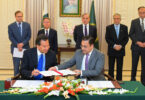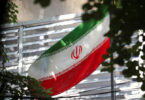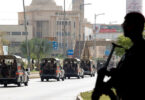PARIS (AP): More than 40,000 people have been intercepted in the Mediterranean and taken to detention camps and torture houses under a European migration policy that is responsible for crimes against humanity, according to a legal document asking the International Criminal Court to take the case Monday.
The request filed with the ICC alleges that European Union officials are knowingly responsible for deaths of migrants at land and sea, and their widespread rape and torture at the hands of a Libyan coast guard funded and trained at the expense of European taxpayers. It names no EU official but cites an ongoing ICC investigation into the fate of migrants in Libya . Officials with the European Commission, Germany and Spain defended EU policy and efforts to help migrants in Libya. France dismissed the accusations as “senseless” and lacking “any legal foundations.”
The legal document cites public EU documents, statements from the French president, the German chancellor and other top officials from the bloc.
“We leave it to the prosecutor, if he dares, if she dares, to go into the structures of power and to investigate at the heart of Brussels, of Paris, of Berlin and Rome and to see by searching in the archives of the meetings of the negotiations who was really behind the scenes trying to push for these policies that triggered the death of more than 14,000 people,” said Juan Branco, a lawyer who co-wrote the report and shared it with The Associated Press.
The ICC is a court of last resort that handles cases of war crimes, crimes against humanity and genocide when other countries are unwilling or unable to prosecute. It is up to the prosecutor, who receives many such requests, to decide whether to investigate and ultimately bring a case. The EU spokeswoman in charge of migration, Natasha Bertaud, declined to comment directly on the court filing, but she and Germany’s government spokesman, Steffen Seibert, each placed blame for deaths at sea firmly on smugglers.
“The EU’s track record on saving lives in the Mediterranean speaks for itself, saving lives has been our top priority and we have been working relentlessly to this end,” Bertaud said.
The first crime, according to the document, was the decision to end the Mare Nostrum rescue operation near the end of 2014. In one year, the operation rescued 150,810 migrants in the Mediterranean as hundreds of thousands crossed the sea. The operation cost more than 9 million euros a month, nearly all paid for by Italy. It was replaced by an operation named Triton, financed by all 28 EU nations at a fraction of the cost. But unlike the earlier operation, Triton ships didn’t patrol directly off the Libyan coast, the origin of most of the flimsy smuggling boats that were taking off for Europe.
Deaths in the Mediterranean then soared. In 2014, around 3,200 migrants died in the sea. The following year, it rose to over 4,000, and in 2016 peaked at over 5,100 deaths and disappearances, according to figures from the International Organization for Migration. “The objective of this new policy was to sacrifice the lives of many in order to impact the behavior of more,” according to the complaint. “It also failed. Crossings did not decrease as predicted, because the risk had little deterrent effect on those who have little to lose to begin with.”
Bertaud said the EU quickly realized its mistake in ending the Mare Nostrum operation and tripled its rescue capacity in 2015, helping save the lives of 730,000 since that year.
But EU countries leaned heavily on the Libyan coast guard to do so, sending money and boats and a degree of training to units of the loosely organized force linked to various factions of Libya’s militias. For Alpha Kaba, a Guinean detained in slave-like conditions in Libya before ultimately making the crossing in 2016, that decision is a travesty. Kaba was rescued by a ship operated by humanitarian organizations. Those are all but gone now from the Mediterranean, after Italy, Malta and other countries repeatedly refused to allow them to dock with migrants on board.






